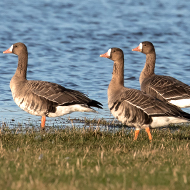
Farmers urged to strengthen their biosecurity measures.
Highly pathogenic avian influenza has been confirmed in wild birds in Gloucestershire.
According to the APHA, a strain of H5N8 avian influenza was identified in three wild geese – one Canada goose and two Greylag geese - near Stroud, on Tuesday (10 November).
An investigation is now underway to see if the discovery is related to the H5N8 case in broiler breeder chickens near Frodsham, Cheshire.
The APHA said that the case in Stroud is unrelated to the case of Low Pathogenic Avian Influenza H5N2 in Kent.
On Friday (6 November) the UK's chief veterinary officers (CVOs) raised the risk level of avian influenza in wild birds from 'medium' to 'high'.
A joint statement for the UK's CVOs read: “We have acted quickly to prevent the spread of disease at both sites in England and are continuing to monitor the situation closely. Bird keepers should remain alert for any signs of disease and report suspected disease immediately.
“It is important now more than ever that bird keepers ensure they are doing all they can to maintain and strengthen good biosecurity on their premises to ensure we prevent further outbreaks.”
More information including how to report dead wild birds and biosecurity advice is available on GOV.UK



 The Federation of Independent Veterinary Practices (FIVP) has announced a third season of its podcast, Practice Matters.
The Federation of Independent Veterinary Practices (FIVP) has announced a third season of its podcast, Practice Matters.